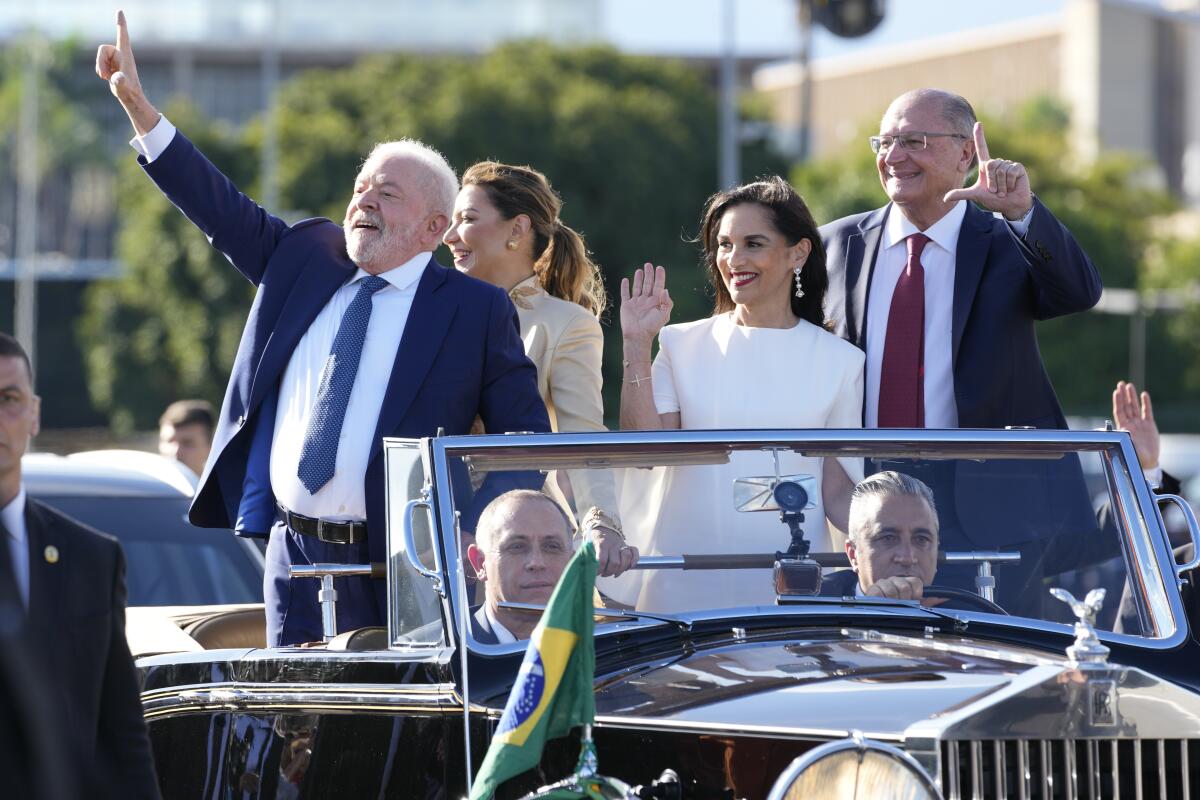Biden greets Brazil’s Lula at the White House

WASHINGTON — President Biden welcomed the new leader of Brazil, Luiz Inácio Lula da Silva, to the White House on Friday, with each hoping for a boost from the other as they try to put their countries’ previous administrations behind them.
Lula, as the Brazilian president is known, and his wife arrived at the South Lawn portico, where they were greeted by Biden before heading into the White House. Reporters shouting questions about the U.S. shooting down a high-altitude aerial device Friday over Alaska were ignored by the leaders.
Biden and Lula both defeated populists with authoritarian tendencies in their presidential elections, with the losing candidates — Donald Trump here and Jair Bolsonaro in Brazil — refusing to recognize the victories.
Supporters of the defeated incumbents attacked government institutions in Washington on Jan. 6, 2021, and in Brasilia on Jan. 8 of this year, in a shocking and violent challenge to the Western Hemisphere’s two largest democracies.
“It’s about solidarity for our respective democracies and really being able to demonstrate that democracy can deliver,” a senior Biden administration official said ahead of the Friday afternoon meeting. He requested anonymity to discuss the encounter beforehand.
Trump had a friendly relationship with Bolsonaro, a far-right politician who praised military dictatorships, attacked LGBTQ and women’s rights and ended environmental restrictions, resulting in massive destruction of the Amazon rainforest.
Biden has been keen to reset the relationship with Brazil from the moment of Lula’s victory, telephoning him promptly to congratulate him and again to offer support when the attacks on his government institutions broke out last month.
As Trump did with Biden in 2021, Bolsonaro refused to attend Lula’s inauguration Jan. 1 and instead fled to southern Florida, where he has been staying near Disney World while attempting to obtain a new U.S. visa.
U.S. officials say they have not received a request from Brazil for Bolsonaro’s extradition. Bolsonaro denies that he instigated the attacks on Brazil’s Supreme Court, Congress and presidential office.
“The primary importance of this trip for Lula is the symbolism of it,” said Bruna Santos of the Brazil Institute at the Wilson Center think tank in Washington. “It is his opportunity to demonstrate his leadership and commitment to democracy and [attract] international cooperation toward fighting the extreme right.”
Lula is a veteran leftist. His other engagements on his short trip to the U.S. include meetings with Sen. Bernie Sanders (I-Vt.), Rep. Alexandria Ocasio-Cortez (D-N.Y.) and officials at the AFL-CIO. But Lula is more pragmatic than earlier in his career and wants Biden’s support as much as that of Cuba’s leaders and others along the political spectrum, which has shifted left in much of Latin America.
After their meeting, Sanders praised Lula for his determination to stand up to “right-wing authoritarians” who seek to destroy democracy.
“Unlike his predecessor, Lula understands the enormous threat that climate change poses to our planet,” Sanders said. “If ever there was a time for international solidarity on these shared challenges, this is it.”
Santos said she believes the relationship between Biden and Lula, who have known each other for years, is one of empathy.
“I don’t think Biden is looking at the region with the lens of the past, right versus left,” she said. “His agenda now is defending democracy in a world of competition, democracy versus autocracy.”
The other major issue for the two presidents is “wrestling back the Amazon from organized crime,” said Cecilia Tornaghi, senior director for policy at the Americas Society in New York. Biden can make a big statement about one of his principal policy goals, the environment, without much opposition, since saving the Amazon is a broadly accepted aim in the climate movement.
“It’s low-hanging fruit for Biden, while Lula needs all the help he can get,” Tornaghi said from Brazil.
The senior Biden administration official said racial justice is also dominating the agenda as the leaders look at “how we can really advance shared priorities on ethnic and racial inclusion in both our countries.”
The Brazilian delegation includes Anielle Franco, the minister for racial equality — a post that was eliminated after Lula left the presidency that he has since revived. Franco’s sister, human rights activist Marielle Franco, was assassinated in 2018, a political murder that remains unsolved.
But there are also areas in which Biden and Lula will not agree. Lula has refused to offer military support to Ukraine in its war with Russia, instead offering to speak to both Ukrainian President Volodymyr Zelensky and Russian President Vladimir Putin to negotiate peace.
More to Read
Get the L.A. Times Politics newsletter
Deeply reported insights into legislation, politics and policy from Sacramento, Washington and beyond. In your inbox three times per week.
You may occasionally receive promotional content from the Los Angeles Times.










